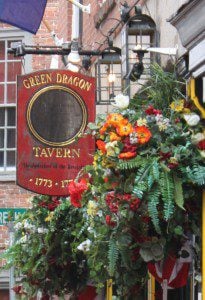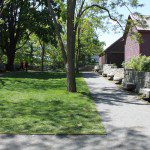
I’m finally home after an unplanned trip to Tennessee for my brother’s funeral and then a planned week in New England. I only had a day and a half between trips, but rescheduling the vacation would have been very expensive, so we went. We spent four days in Boston and three days in Bar Harbor, Maine, primarily visiting historical sites and places of natural beauty. It was a very nice trip and I came back with lots to write about.
While I’ve been gone, the Pagan internet has been all abuzz on the general topic of gods and superheroes. I’ve read much of it but mostly stayed out of the debate – reading on a 3½ inch screen is hard enough; composing on it is not how I want to spend my vacation. If you’re new to the topic, John Halstead at The Allergic Pagan has a very good analysis of the arguments. Go there and follow the links. While you’re there, read John’s earlier post on the Three Centers of Paganism. I’ve said I’ve given up on defining Paganism, but Halstead’s model of three overlapping circles of deity-centric, self-centric, and Nature-centric movements is so accurate and so useful I think I’m just going to refer people to it in the future.
I don’t have anything substantial to add to the theories currently under discussion – a lot of very intelligent, very experienced, very thoughtful Pagans have brought up more ideas than I could have if I had been writing on this from the beginning. But being a good engineer, and being blessed with time to contemplate the arguments, I’ve been thinking about what they’re good for. That’s the difference between science and engineering – science says “what is it?” while engineering says “what can I do with it?” I have two observations along those lines.
The first, as I hope has become apparent, is that this conversation isn’t about whether or not it’s OK to worship Superman. It’s a debate about what the gods are and how we should relate to them – a debate that has very different answers depending on whether your practice is deity-centric, self-centric, or Nature-centric. It’s about the definition of truth and the difference between literal truth and mythical truth. In this conversation and others like it, we are debating the theological and philosophical foundations of this new religion we call Paganism.
For those who think this debate is a waste of time, I encourage you to remember the Council of Nicaea. In 325 CE the Emperor Constantine invited all bishops of the newly established Christian religion to settle some major theological disagreements within the Church. 1800 bishops were invited – about 300 attended. Those 300 bishops built a theological foundation that is still in use today. What might Christianity have become if the other 1500 bishops had showed up? What might it have become if ordinary Christians had been allowed to participate?
We’ll never know the answer to those questions. Perhaps the 300 bishops were a representative sample of Christian thought at the time and the outcome would have been the same. More likely, though, the additional voices would have changed the foundations of Christianity, perhaps subtly and perhaps dramatically.
The intellectual foundations of modern Paganism are being debated here and now. There is no formal gathering and no creeds will be issued, but the outcomes of these debates will affect what we and our spiritual descendants believe and how we will practice for generations to come. Are you sure you don’t want to participate?
Unlike in 325 CE, no invitation from an emperor is required, nor is a status equivalent to a bishop. All that’s required is a computer and the ability to form an argument that is both rational and inspiring.
It’s an exciting time to be a Pagan!
The second observation I want to make is that while these debates are both important and interesting, they are not all that’s important and interesting. Where ever you place yourself in the overlapping circles of deity-centric, self-centric, and Nature-centric movements, what you believe is not as important as what you do. Honor your gods and goddesses. Work your magic and refine your soul. Have reverence for Nature and care for the natural world. Worship, in solitude and in community. Whatever your regular spiritual practices, do them.
It’s good to be back. I’ve been away from my altar for two weeks. I’ve worshipped at other altars – some figurative and some literal – and I’ve had some very good and very necessary time away. But my paying job isn’t the only place where it’s time to go back to work.

















